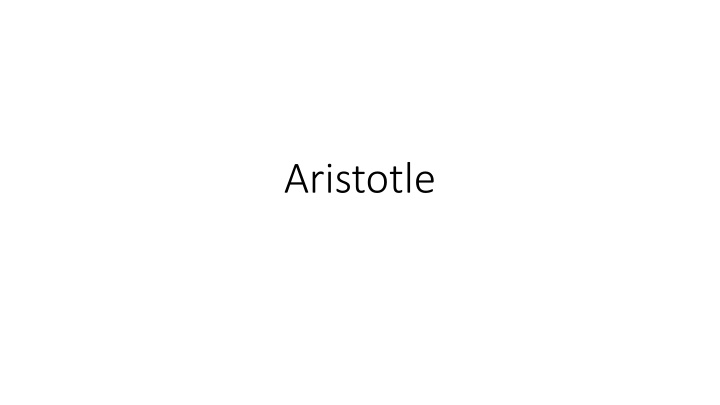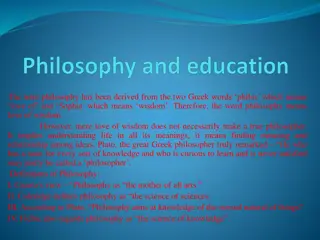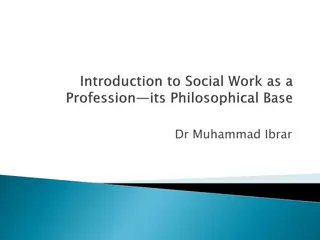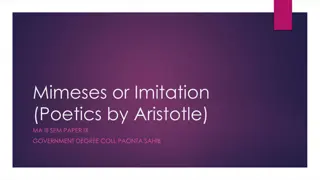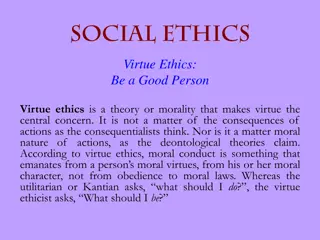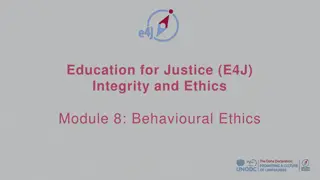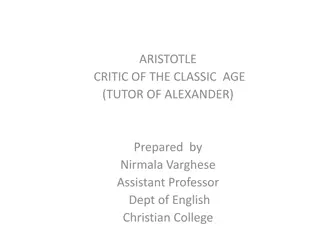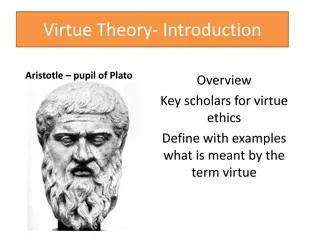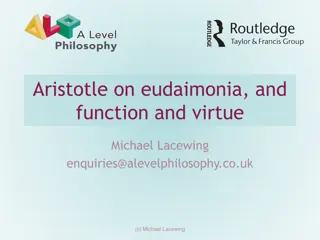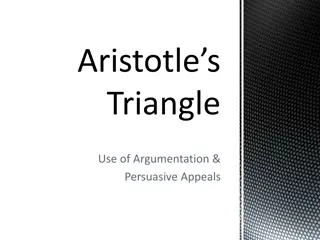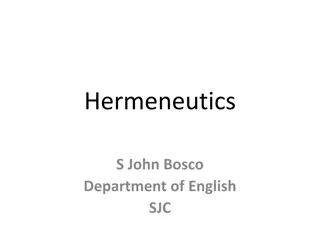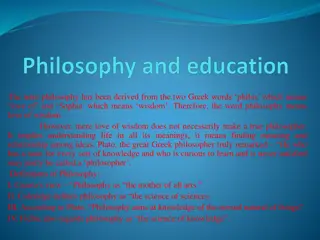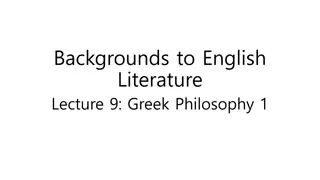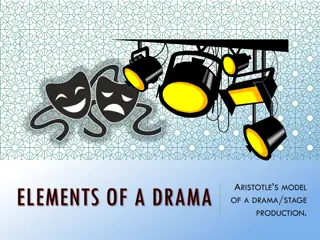Aristotle's Ethical Philosophy and the Concept of Eudaimonia
Aristotle, a renowned ancient philosopher, introduced the concept of eudaimonia in his Nicomachean Ethics. Eudaimonia, often translated as flourishing, signifies the ultimate human good achieved through fulfilling one's unique function well. Aristotle's ethical framework emphasizes the pursuit of virtue and excellence in all aspects of life to attain true happiness.
Download Presentation

Please find below an Image/Link to download the presentation.
The content on the website is provided AS IS for your information and personal use only. It may not be sold, licensed, or shared on other websites without obtaining consent from the author.If you encounter any issues during the download, it is possible that the publisher has removed the file from their server.
You are allowed to download the files provided on this website for personal or commercial use, subject to the condition that they are used lawfully. All files are the property of their respective owners.
The content on the website is provided AS IS for your information and personal use only. It may not be sold, licensed, or shared on other websites without obtaining consent from the author.
E N D
Presentation Transcript
Aristotle (384-322 BCE) Student at Plato s Academy Tutor to Alexander the Great Founded his own school later, the Lyceum Agrees with Plato in some areas; also sharp disagreements Interested in all areas of inquiry Pioneered logic as a formal area of study
Nicomachean Ethics The human good Every art and every inquiry, and similarly every action and pursuit, is thought to aim at some good.
Nicomachean Ethics The human good Every art and every inquiry, and similarly every action and pursuit, is thought to aim at some good. Some ends are subordinate to others Example: Bridle-making is subordinate to riding.
Nicomachean Ethics The human good Every art and every inquiry, and similarly every action and pursuit, is thought to aim at some good. Some ends are subordinate to others Example: Bridle-making is subordinate to riding. But not every end can be subordinate to another, so there must be some end that is desired for its own sake.
Nicomachean Ethics The human good Every art and every inquiry, and similarly every action and pursuit, is thought to aim at some good. Some ends are subordinate to others Example: Bridle-making is subordinate to riding. But not every end can be subordinate to another, so there must be some end that is desired for its own sake. For human beings, this end is eudaimonia.
Nicomachean Ethics Eudaimonia: sometimes translated as happiness but more accurately as flourishing
Nicomachean Ethics A thing is good when it fulfills its characteristic function well. Example: A good flute player is one who plays the flute well.
Nicomachean Ethics A thing is good when it fulfills its characteristic function well. Example: A good flute player is one who plays the flute well. What is the function of human beings? The function of human beings must be unique to humans.
Nicomachean Ethics A thing is good when it fulfills its characteristic function well. Example: A good flute player is one who plays the flute well. What is the function of human beings? The function of human beings must be unique to humans. Life and perception are shared by other organisms. Reason is unique to human beings. Therefore, rational activity is the essential defining characteristic of human beings.
Nicomachean Ethics A thing is good when it fulfills its characteristic function well. Example: A good flute player is one who plays the flute well. What is the function of human beings? The function of human beings must be unique to humans. Life and perception are shared by other organisms. Reason is unique to human beings. Therefore, rational activity is the essential defining characteristic of human beings. Aristotle: The human good consists of excellent activity involving reason.
Nicomachean Ethics Virtues The human good consists of activity in accordance with virtue.
Nicomachean Ethics Virtues The human good consists of activity in accordance with virtue. A virtue is a state of character, a steady disposition to act, think, and feel in particular ways.
Nicomachean Ethics Virtues The human good consists of activity in accordance with virtue. A virtue is a state of character, a steady disposition to act, think, and feel in particular ways. Virtues direct us to choose the mean between extremes, avoiding both excess and defect.
Nicomachean Ethics Virtues The human good consists of activity in accordance with virtue. A virtue is a state of character, a steady disposition to act, think, and feel in particular ways. Virtues direct us to choose the mean between extremes, avoiding both excess and defect. Aristotle distinguishes between moral virtues and intellectual virtues.
The Doctrine of the Mean Virtues are a mean between extremes a vice of excess and a vice of deficiency
The Doctrine of the Mean Virtues are a mean between extremes a vice of excess and a vice of deficiency Cowardice Courage Rashness Insensible Moderate Excessive Apathetic Good temper Irascible Undue humility Pride Vanity Boorishness Wit -- Buffoonery
Voluntary action and moral responsibility Praise and blame are only rightly bestowed on voluntary actions. An action is voluntary only if: It is not done under compulsion. It is not done due to ignorance of the circumstances. The principle that generates the action is within the agent. Moral virtue involves voluntary actions, so we can be praised for being virtuous and blamed for being vicious.
Friendship Three kinds of friends
Friendship Three kinds of friends Friendship of utility Friendship of pleasure Complete friendship
Friendship Three kinds of friends Friendship of utility Friendship of pleasure Complete friendship True friendship involves the development of virtue Care about the friend for the friend s sake
The Good Life The best kind of life consists of excellent rational activity. If happiness is activity in accordance with virtue, it is reasonable that it should be in accordance with the highest virtue; and this will be that of the best thing in us. The activity of this in accordance with its proper virtue will be perfect happiness. The highest virtue is wisdom, so the best life will be a life of contemplation.
